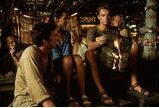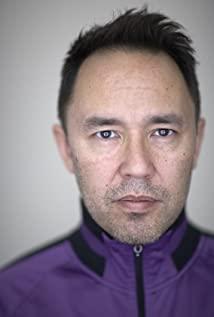What a surprise, I liked it more than I thought.
The story is a very common one. Young people go out to explore the world, hear a legend, yearn for it, and then come to a paradise-like utopian world. In the end, because of a series of things, he finally returned to human society.
You see, it sounds like there is no desire to watch at all.
But Danny Boyle has a way of filming such a well-known plot with its ups and downs.
Personally, I don't think what this movie is trying to say is that utopias are stupid* things that shouldn't exist, but that all utopias are torn down. Because I thought so too at the beginning, until finally, Richard received everyone's photos in the mailbox, and he sighed with emotion about that wonderful time, and I suddenly had a realization:
As long as you are human, you cannot build a utopia.
So the small society in the movie will eventually die out. It is subject to Sal's human rules and Sal's human desires. This is not what a real utopian society should look like.
Utopia is a state, not a figurative form that humans can build and navigate.
It is a kind of spiritual belonging, a sense of identity, an idealistic state that has abandoned human nature. Like Richard's fond memories of seeing the photo, that memory is utopia itself.
It is precisely because they are the same type of people who will follow the map to the island, who are willing to temporarily abandon human nature for the sake of ideals, that the small society in the movie can appear.
It is precisely because they are all the same human beings who came to the island following the map, that the small society in the movie cannot survive.
I have to mention one of my favorite episodes here .
That's the part where Richard encounters a shark, confronts a shark, beats a shark, and tells the story. Don't you know that his speech is fake? Don't you know he's scared? Sal's carpenter boyfriend pointed out that Richard was just lucky, does anyone come forward and agree? Did anyone stand up against it?
They just want to believe what they want to believe and stick to what they want to stick to.
They must stick to their ideals and abandon their humanity in order to maintain the small society in the movie.
Richard's story, like the utopia itself, has a pompous innocence; Richard's reality is like human reality, constantly reminding us of the hypocrisy of island life.
In addition to this, there are many elements of the movie that have been trying to bring the audience back to reality:
For example, the gun-wielding marijuana dealer who coexists with Xanadu, for example, needs to return to the human world to purchase necessities, such as Richard and Sal slept in to protect his rights and so on.
But in the end, the one who succeeded in pulling Richard back to reality was precisely the one who gave the copy of the map out of gratitude to him before he went to the island.
If the act of giving the map happened when returning to the mainland after going to the island, then the movie would be completely ruined. Sending the map must be unconscious, it must be kind, and it must be a reward, so that Richard's understanding can stand.
When the audience can't blame him, they will think: Why can't the map be shared with outsiders?
Then the audience will discover that the driving force for building a utopian society is everyone's ideal; and the rules for maintaining a utopian society are actually Sal's selfishness.
With the ubiquitous reality, the audience can easily see clearly: what they maintain is not a real utopian society at all, and the small society in the film is just a castle in the air above human selfish desires.
Richard also understood at this time.
Why does that person have to be Richard?
Lies must be exposed by him, because he is a young American who likes to play games. The game itself is another ideal and utopia. A person who is used to thinking about games is also used to getting out of thinking about games.
Therefore, the most climax of the plot is that he used the game world view to successfully form an army, which led to the disintegration of this hypocritical society on the island.
If you think about it, Richard's final confrontation with Sal is actually the same as Richard's life-threatening fight with a shark.
You will be afraid, you will be naive, you will succeed, and you will almost play away. Because he was originally a human being, with human limitations and human luck.
Between Richard and Sal, there will also be "a moment for us".
Finally , when I watch this movie, there is a strange logic that jumps out of the movie itself.
Richard lost his keys that rainy night, and the person he met in the cabin next door was himself in another timeline. That timeline goes slower, so Richard B always maintains his yearning for a utopian world.
And when Richard went to the island, went through different time flow rates, returned to land to purchase, and met Richard B, he had already obeyed the rules of Utopia, so he wanted to prevent Richard B from going to the island, and even beat the other party. One punch. At that time, Richard B still maintained his yearning for the utopian world.
In the end, all the lies were exposed, Richard had an epiphany in the wild, saw through the lies of this small world, and decided to break the rules of utopia. So he decided to use reality (the gun of the marijuana dealer) to end this hypocritical world and the still innocent self.
From that moment on, his life could only look forward and never go back.
Reality is like the outside world and island life, life is like Richard and Richard B - you can believe what you want to believe, stick to what you want to stick to, but you have to live on.
As long as you are a person, you have to be a good person.
I've watched four Danny Boyle movies, and all four hit me.
It's not just that he can tell stories, it's not just that there are always some very psychedelic and impressive scenes in his movies, it's not just that he can make a literary film feel suspenseful...
What I admire most is his psychological control of small groups and his arrangement of dramatic conflicts: everything that happens is foreshadowed early in the morning, buried in the cognitive stage of people, buried in the growth environment of people, buried in the in human character.
Watching his movies, it's hard for you to pick out logical mistakes, and what's more, you don't have time to think about logic at all. Interlocking and captivating, you never know what's going to happen in the next second. A small jump from common sense, and you are looking forward to what will happen in the next second.
Danny Boyle is truly amazing!
View more about The Beach reviews











